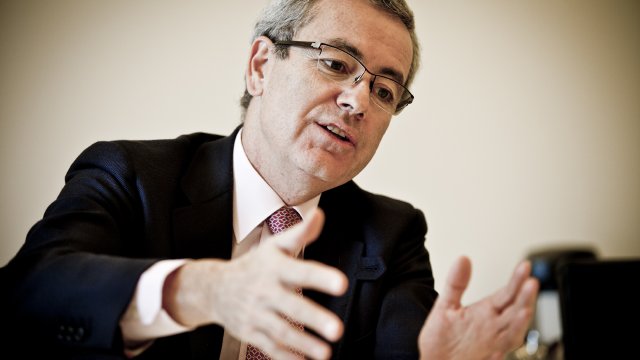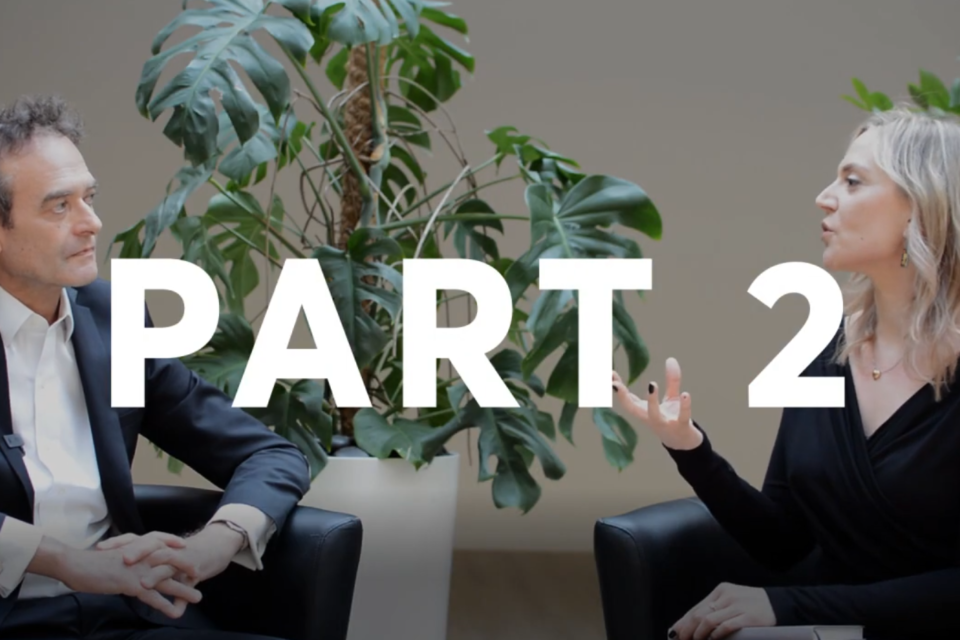We speak to Jean-Pierre Clamadieu, CEO of Solvay, about the benefits of having public sector experience in leading a private company, and about the role European business has in promoting European values.
As a global leader in advanced materials and specialty chemicals, Solvay has a big voice in European industrial policy. We spoke to CEO Jean-Pierre Clamadieu about Solvay’s business priorities and policy agenda.
Solvay is active in numerous markets (agri, food, feed, automotive, aerospace etc.). What are Solvay’s biggest challenges to maintain a coherent, overarching brand?
Solvay has a clear strategy when it comes to its activities; what may appear as a highly heterogeneous portfolio is, in fact, based on three main axes of development.
First, over the years we have developed a solid portfolio in non-metallic advanced materials. These are used in a vast range of markets but based on similar technologies.
The second axis is based on formulations or “functionalised liquids”. They are not only used in hair and personal care products but also in agrochemicals formulations and oil and gas exploration. Again, these are based on the same technologies, the same chemistry.
Next to these axes, we have a couple of more traditional businesses; soda ash and hydrogen peroxide, where we have a strong global leadership position.
As a chemical company, Solvay Research and Innovation corporate entity remains the core of our business. It supports our growth strategy and differentiates us from our peers. Corporate R&I is an innovation hub where researchers work collaboratively with GBUs to develop new and breakthrough technologies.
Although we have a well-defined portfolio of activities, it’s also true that we are addressing very disparate markets and managing a large number of technologies. Therefore, one challenge for us is to ensure that we are more than just a collection of isolated businesses, where Solvay would be a holding company, but rather an integrated industrial company. For that, we have developed some core competencies (M&A, operational performance toolboxes, talent management, innovation …) which allow each of these businesses to perform better within Solvay than they would do as isolated entities.
What is your opinion on the EU’s direction in its chemicals & energy policy within Horizon 2030?
Europe, I believe, currently faces a major challenge when it comes to energy. Access to energy is much less competitive than in other regions, in particular in North America. There, they have decided to develop shale gas; this is not only a highly competitive source of energy but also – for the chemical industry – an important raw material.
The industry was pleased when the “Juncker Commission” put energy amongst its top priorities. Indeed, I think we have taken steps towards developing an authentic, Europe-wide energy policy. However, there remains a great deal to be done to ensure that Europe has access to genuinely competitive, reliable and sustainable energy.
Concerning the impact of chemical products on health and environment, Europe has set high standards; REACH is a far-reaching regulation. Unfortunately, the European citizens don’t always recognize that. I see two opportunities for development in this area. First, making sure that our fellow citizens understand that REACH is genuinely a policy that defines some of the highest safety standards in the world; second, ensuring Europe markets these standards around the world; for example, by way of mutual cooperation agreements. This would make sure that at least some of these principles are adopted elsewhere. To date, Europe has not been too good at this.
Do you believe that leading European industry players such a Solvay have a major role in promoting European values in the current turbulent times?
I believe that European business leaders have a responsibility in helping to defend the European project much more vocally. Most large European companies are very pro-European; sometimes we are perhaps too timid in saying what Europe represents for us.
I was shocked to see that in the first round of the last French presidential elections, 50 percent of voters supported anti-European candidates. Therefore, in between the two rounds, I wrote an OpEd in “Les Echos” to underline the importance of Europe. I truly believe that Europe is key to both companies and employees – to all citizens.
Recently, the European project has faced criticism both inside and from abroad. What we in the industry can do is to showcase what is unique in our European business and societal models. For example, a few months ago Solvay launched “Solvay Cares” initiative, providing employees around the world with essential social benefits, such as paid maternity leave, health, and life insurance, based on European standards. The 14-week paid maternity leave turned out to be beneficial not only for our employees in developing countries but also in the US. As a company with strong European roots, it is indeed a great opportunity for Solvay to demonstrate that globalization brings social benefits to our employees worldwide.
You have had an impressive career both in the public and private sectors. Could you reflect on some of the most important professional challenges you have had to face?
I have lived through many interesting moments in my career, with the opportunity to be active in both public and private sectors. I think we should increasingly encourage such transitions. It’s not easy; we see more and more questions centered on the conflicts of interest. However, I believe it is valuable to have people with experience moving between the public and private sectors; we just need to be careful and set clear and simple guidelines.
At the beginning of my career, I spent a couple of years as an adviser to the Minister of Labour in France. It was fascinating to participate in the process of setting and implementing public policies.
During my time in the private sector, one of the most challenging moments to date was at Rhodia, a French-headquartered chemical company. When I became CEO, Rhodia was facing a potential liquidity crisis, a life-threatening condition for any company. The process we put in place was successful, not only because of my efforts but also because everyone worked hard to help steer the company out of this difficult situation. As a CEO, making sure, that the company would emerge stronger from these dire moments was personally both very challenging and fulfilling.
Another challenging moment came when Solvay bought Rhodia and I was appointed by the Board to become the CEO of Solvay. I had to organize a quick and successful integration of the two companies, which was also a great experience.
Which skills and characteristics do you perceive as most important to successfully represent Solvay to EU institutions?
It requires a complex set of skills. Ideally, we want people who know what the company is about – our technology, our products and our way of working. However, I recognize that advocacy requires certain specific skills, and it’s difficult to find someone with both. People will usually have experience in one area and have to – quickly – acquire competency in the other one.
Sometimes, when I meet foreign ministers to discuss specific issues, I feel that having a background in the public sector, even if it is specific to the French government, allows me a slightly better understanding of their potential expectations, priorities, and limits.
Do you think public affairs professionals may have a hard time adapting to a highly technical industry such as the chemical one?
At Solvay, our Head of Public Affairs spent around 20 years as a Belgian diplomat and has adapted very well to corporate life. He knows Solvay well and he can bridge the gap between what governments expect and what the company seeks to achieve.
Recently I was President of CEFIC, the European Chemical Industry Association. During my mandate, I had to drive recruitment of the new Director General. For many years, the DG at CEFIC was always someone from the chemical industry. This time, we made a different choice by hiring Marco Mensink, who had a strong background in advocacy. When he came on board, he had no previous experience of the chemical industry, but it was a great way to rejuvenate CEFIC. As someone who is highly professional in advocacy, he naturally took the time and effort to learn about the industry and is helping us create a more efficient CEFIC today.
How do you define success?
As a CEO, I think defining success – personal success, not the company success – is rather simple. It is really the ability to develop mid and long-term vision and make sure that you can align all the energy and all the internal and external stakeholders to support it.
Every day, I am distracted by short-term issues that could make me lose the sight of the vision. To be a successful CEO, you need to avoid distraction and make sure that these short-term issues are managed while keeping the company on track.
Your daily schedule is clearly extremely busy. What do you like to do to “disconnect” and recharge your batteries?
First of all, I have two daughters that are still young, so I am trying to spend time with them and help them develop. So far, so good! I have various other interests; I love to go to the opera, to the movies and I love to read. I try to keep also some time for my personal development, quite a challenge!


